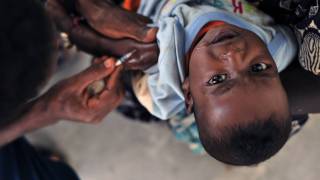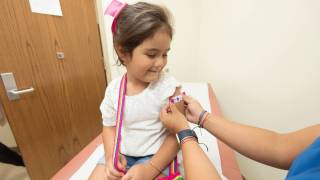Should Under-Vaccinated Patients Be Fired?

A recent C.S. Mott Children's Hospital National Poll on Children's Health asked a national sample of parents of children 0-18 years old about how primary care offices should handle children whose ‘parents refuse all vaccines.’
This University of Michigan study published on August 19, 2019, reported that 30 percent of parents polled say that their child’s primary care office ‘should ask parents who refuse all vaccines to find another health provider.’
“When a family refuses all childhood vaccines, it puts providers in a challenging position,” said Mott Poll co-director Sarah Clark, MPH, in a press release.
“A completely unvaccinated child is unprotected against harmful and contagious diseases, such as measles, pertussis, and chickenpox.”
“Children who skip vaccines also pose a risk of transmitting diseases to other patients.”
“This can be especially risky exposure for vulnerable populations, including infants too young to receive vaccines, elderly patients, patients with weakened immune systems or pregnant women.”
The poll based on responses from 2,032 parents also found that many parents are unaware of policies in their child’s primary care office regarding unvaccinated children.
Thirty-nine percent of parents say their provider has a policy requiring children to get all recommended vaccines.
And, only 6 percent of parents say their child’s primary care office doesn’t allow unvaccinated children to use the same waiting area as other patients, while 2 percent say the office allows unvaccinated children to use the waiting area if they wear a mask.
Twenty-four percent of parents say their child’s primary care office allows unvaccinated children to use the same waiting area as other patients with no restrictions.
Typically, Clark says, ‘child health providers will have multiple discussions with parents to explain the importance of childhood vaccinations, and to answer any questions the parents have about possible side effects.’
“In addition to explaining how vaccines protect the health of the child, providers also may share information about why an unvaccinated child exposes other children and patients to dangerous health risks too.”
In the USA, vaccines recommended by the Centers for Disease Control and Prevention (CDC) are often given in conjunction with well-child visits, with the primary care provider.
Barriers in scheduling appointments or parents’ awareness about recommended vaccines may cause children to experience delays in vaccination or to miss some vaccines.
A less common situation – but increasing in recent years – is the parental refusal of all vaccines for their child.
“Primary care providers need to think carefully about whether to institute policies to prevent their patients from being exposed to vaccine-preventable diseases and then communicate those policies to all patients in their practice.”
“Any parent – and particularly parents of infants or immunocompromised children – should ask their child’s primary care provider about policies surrounding unvaccinated children,” Clark added.
This University of Michigan Mott Poll asked a national sample of parents about their awareness of current policies, and preferences for future actions, in how their child's primary care office handles the subset of parents who refuse all vaccines for their children, even after multiple discussions.
Our Trust Standards: Medical Advisory Committee

























